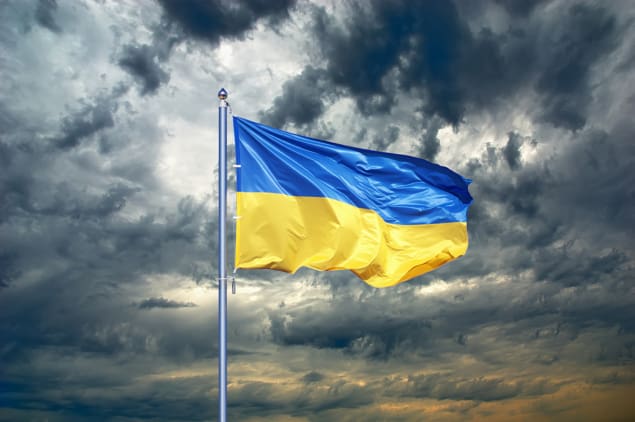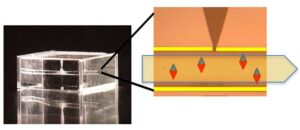
Almost 20% of scientists in Ukraine fled the country by the end of 2022 as a result of the Russian invasion that began in February of that year. That’s according to an investigation by Swiss and Ukrainian researchers at EPFL Lausanne, which also finds that 20% of those who stayed have been forced to move elsewhere in the country (Humanit Soc Sci Commun 10 856).
As of January 2024, the United Nations Human Rights Council estimates that 6.3 million refugees have left Ukraine while a similar number of people have been internally displaced. Before the invasion, there were estimated to be some 100 000 scientists working in Ukraine. The study surveyed a total of 2559 Ukrainian active researchers who were employed at institutions of higher education or public research organisations when the war struck.
It finds that the top 10% most prolific scientists – those spending more than 20 hours per week on research and those scientists with the highest degrees – were significantly more likely to leave Ukraine compared to others. Yet only 58% of emigrant scientists became affiliated with an overseas academic host institution, and a mere 14% of migrant scientists have since secured long-term contracts.

Ukrainian scientists attempt to move forward following the ravages of war
“Many of these emigrant scientists are under precarious contracts at their host institutions,” says Gaétan de Rassenfosse a science policy researcher at EPFL. “Of the scientists who stay in Ukraine, if still alive, about 15% have left research, and others have little time to devote to research given the circumstances of war.”
The team estimates that as of today, as many as many as 7% of Ukrainian researchers will never return, having either left the country permanently or stopped working in science for good. However, that number may be even greater, given that the survey concluded over a year ago in December 2022, with the war still ongoing.
Those who stayed doing science in the country face significant challenges, with a fifth not able to access their institution in its original location because it either functions online only or because the institute has moved completely.
Reverse-spillovers
Seeds of hope are, however, identified in the report. The authors note that temporary migration can benefit Ukrainian science in the long term due to the “reverse-spillover” of knowledge, as emigrants build new connections abroad and bring back new skills to their home country. Indeed, 87% of Ukrainian scientists believe that their stay at a foreign institution improves their scientific abilities.
The authors call for more longer-term scholarships to be provided for migrant scientists, which echoes similar calls from the international non-governmental organization #ScienceForUkraine. For those who have stayed in Ukraine, the study suggests that “institutions across Europe and beyond” should offer a host of support programmes, such as remote visiting initiatives, access to digital libraries and computing resources, as well as collaborative research grants.
- SEO Powered Content & PR Distribution. Get Amplified Today.
- PlatoData.Network Vertical Generative Ai. Empower Yourself. Access Here.
- PlatoAiStream. Web3 Intelligence. Knowledge Amplified. Access Here.
- PlatoESG. Carbon, CleanTech, Energy, Environment, Solar, Waste Management. Access Here.
- PlatoHealth. Biotech and Clinical Trials Intelligence. Access Here.
- Source: https://physicsworld.com/a/ukraine-invasion-forced-a-fifth-of-scientists-to-flee-the-country-in-2022-study-finds/
- :has
- :not
- 000
- 100
- 15%
- 160
- 20
- 2022
- 2024
- a
- abilities
- Able
- About
- abroad
- academic
- access
- According
- across
- active
- Affiliated
- ago
- alive
- also
- an
- and
- ARE
- AS
- At
- attempt
- authors
- back
- BE
- became
- because
- been
- before
- began
- believe
- benefit
- bring
- build
- by
- call
- Calls
- CAN
- challenges
- circumstances
- collaborative
- compared
- completely
- computing
- concluded
- Connections
- contracts
- country
- December
- digital
- displaced
- doing
- due
- Education
- either
- elsewhere
- employed
- end
- estimated
- estimates
- Europe
- Even
- Face
- February
- finds
- following
- For
- forced
- foreign
- Forward
- from
- functions
- given
- good
- grants
- greater
- Have
- having
- higher
- Higher education
- highest
- Home
- hope
- host
- HOURS
- However
- http
- HTTPS
- human
- human rights
- identified
- if
- image
- improves
- in
- indeed
- information
- initiatives
- Institute
- Institution
- institutions
- internally
- International
- invasion
- investigation
- issue
- IT
- ITS
- January
- jpg
- knowledge
- Leave
- left
- libraries
- likely
- little
- location
- Long
- long-term
- many
- max-width
- May..
- mere
- migrant
- migration
- million
- more
- most
- move
- move forward
- moved
- National
- Nations
- never
- New
- note
- number
- of
- offer
- on
- ongoing
- online
- only
- or
- Organisations
- organization
- original
- Others
- over
- overseas
- People
- per
- permanently
- Physics
- Physics World
- plato
- Plato Data Intelligence
- PlatoData
- policy
- programmes
- prolific
- provided
- public
- refugees
- remote
- report
- research
- researcher
- researchers
- Resources
- result
- return
- rights
- russian
- says
- scholarships
- School
- SCI
- Science
- scientific
- scientists
- Secured
- should
- significant
- significantly
- similar
- since
- skills
- some
- Spending
- stay
- stayed
- Still
- stopped
- Study
- such
- Suggests
- support
- Survey
- surveyed
- Swiss
- team
- Technology
- temporary
- term
- than
- that
- The
- their
- There.
- These
- those
- thumbnail
- time
- to
- today
- top
- Total
- true
- Ukraine
- Ukrainian
- under
- university
- war
- week
- WELL
- were
- when
- which
- while
- WHO
- will
- with
- working
- world
- year
- yet
- zephyrnet













